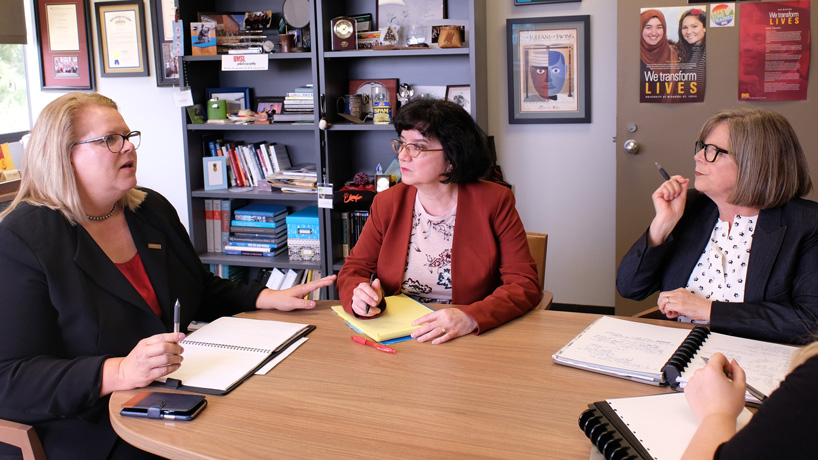
Chancellor Kristin Sobolik (at left) Provost Marie Mora (center), seen in a photo from 2019, are the principal investigator and lead co-PI, respectively, on a $1 million National Science Foundation ADVANCE grant that will help UMSL make organizational changes to better recruit and retain women in faculty positions in STEM and social and behavioral sciences. (Photo by August Jennewein)
The University of Missouri–St. Louis is committed to promoting diversity, equity and inclusion throughout society, and that begins inside its own ranks.
UMSL applied for and received a $1 million grant from the National Science Foundation ADVANCE program, which supports universities making organizational changes to improve gender equity in academic careers in the fields of science – including the social and behavioral sciences – technology, engineering and mathematics.
UMSL’s ADVANCE leadership team is looking to develop and enhance institutional structures, polices and processes. The goal is not only to improve faculty recruitment processes but to provide women with a climate where they feel supported and can thrive.
The faculty play a critical role in teaching and inspiring the next generation of students who will go on to lead a large part of the growing STEM workforce in St. Louis.
“We are excited to be part of the national ADVANCE community of institutions taking the lead and foster gender equity in the STEM fields, and we look forward to making real change that can serve as an example for others in our region and across the country,” Chancellor Kristin Sobolik said. “Having the NSF’s confidence in our ability to implement the initiatives in our proposal will serve us well as we begin this work.”
Sobolik is the principal investigator on the grant while Provost and Executive Vice Chancellor for Academic Affairs Marie Mora is the lead co-PI, which signals the university’s commitment to meeting its objectives. Additional co-PIs include Andrew Kersten, dean of the College of Arts and Sciences; Matthew Taylor, associate dean for faculty affairs in the College of Arts and Sciences; and Bettina Casad, associate professor and director of the Behavioral Neuroscience Program.
Prior to joining UMSL, both Sobolik and Mora worked with NSF ADVANCE programs at other institutions. Sobolik did so at both the University of Maine and Wright State University. Mora was involved in developing and implementing processes as part of an NSF ADVANCE Institutional Transformation grant at the University of Texas Rio Grande Valley.
Through the grant, UMSL will adapt initiatives that have been tested and proven successful at other institutions that sought to enhance gender equity in their faculty ranks.
“Given where we are as an institution, we did not envision necessarily having to reinvent the wheel,” Mora said. “Looking at our student and faculty demographics, it became clear that there are areas we need to examine with respect to our faculty recruitment and retention policies and practices to build gender equity. A lot of other institutions have done work in that area.
“One size does not fit all, and so it’s important for us to consider strategies from other institutions that might be more aligned with our student demographics and our faculty demographics. Considering the intersection of gender and race is particularly important.”
Mora expects the grant team will look closely at ADVANCE initiatives at universities such as the University of California, Davis; Florida International University; Texas Rio Grande Valley; Case Western Reserve University; and others.
All have made changes to their recruitment strategies and processes. Case Western, for example, has empowered deans to review short lists of faculty applicants, and they can turn the process back to search committees if it is determined that there isn’t enough diversity among the list of candidates.
Some institutions have also altered the processes for faculty tenure and promotion.
Mora is already working closely with Human Resources to develop additional trainings for faculty search committees.
The grant leadership team will also begin examining onboarding procedures for new faculty members as well as analyzing the climate of individual departments across the university.
“We want to make sure that all faculty who come to UMSL feel a sense of inclusion and belonging,” Mora said. “We know that makes a big difference in terms of our faculty recruitment, but it also makes a difference in faculty retention and in building a positive workplace climate overall.”
Recognizing that organizational change doesn’t happen overnight, the NSF ADVANCE grant gives UMSL three years to implement the changes that will lead to results. The team will be collecting and analyzing data throughout the project and will use internal and external evaluators to measure their progress.
Complementing the inclusive excellence initiatives in UMSL’s strategic plan, the process of transforming the institution through ADVANCE-related strategies began last year through a critical review of the areas in which UMSL could improve as the NSF proposal was developed.
Sobolik, Mora and the rest of the team began making changes even before learning they’d been awarded the grant to start impacting the way UMSL approaches recruitment of not only women faculty but also staff and in all areas of the university.
“This grant has a specific focus on women faculty in STEM and social sciences, but we expect the initiatives will have a broader influence across the institution to include men, other disciplines, and staff,” Sobolik said. “Ultimately, our goal is to impact our students and eventually the St. Louis workforce as we provide more role models in the classroom and bring in a diversity of ideas and perspectives.”
Media Coverage














